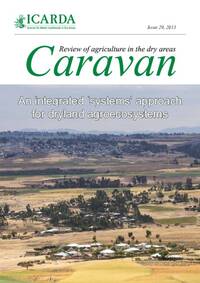Caravan 29: An integrated ‘systems’ approach for dryland agroecosystems

Authors:
The sustainable way forward: An integrated ‘systems’ approach for addressing the challenges facing dryland agroecosystems.
Dryland agroecosystems present unique complexities for more than 2.3 billion people in the developing world who depend mainly on agriculture for their livelihoods. They are faced with various constraints including natural resource limitations and degradation, water scarcity, encroaching desertification and serious climate change implications. Poor access to markets and inputs, weak governance and lack of information about alternative production technologies also limit the options available to farmers to increase both their agricultural productivity and income. Results of the past interventions to address these challenges clearly show that unless these complexities are viewed holistically as productions systems and addressed in an integrated fashion, strategies and interventions to address these challenges will have limited impact.
This issue of Caravan presents some successes of the collaboration of scientists and other stakeholders from ICARDA and national partners, where participatory research with local communities and women’s groups in particular, has reaped a range of benefits through an integrated systems approach. These examples demonstrate a path forward for sustainably enhancing agricultural productivity and improving the livelihoods of communities in dry areas.
